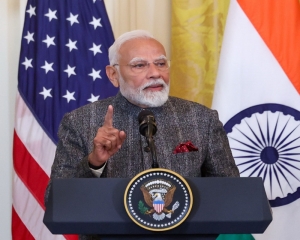Elections serve as a litmus test for the health of a nation’s democracy, revealing the true character of leaders
The narrative that happens during the time of the General Election is an indicator of the quality of democracy practiced in a country. Leaders, especially the star campaigners, should set a standard for the public discourse through their speeches and interviews with the media persons. They should bear in mind that every word they utter is being recorded digitally with cameras and audio instruments. Whatever they speak is under public scrutiny and any aberrations would lead to major mishaps.
The campaign speeches in India took a new low during the tenure of Rajiv Gandhi as Prime Minister (1984-1989). Rajiv, who took over the post of Prime Minister following the assassination of his mother Indira Gandhi, was a refreshing change from the image of conventional Congress leaders spotting the ear-to-ear smile and perverted smile. But that did not last long as the Government he headed was enmeshed in corruption charges ranging from Bofors Gun to HDW submarine deals. It was futile to expect the truncated Opposition to sit idle while the whole world was discussing the gun contract. Rajiv Gandhi, who was upset with the charges, went to the extent of describing the opposition as political limpets. This is a term coined by a speech writer of Rajiv who always flouted his Indian Foreign Service background to play one-upmanship against old-time Congress leaders.
On seeing that Rajiv Gandhi was upset with the allegations of corruption, Ram Jethmalani, the doyen among the country’s lawyers launched a fusillade of questions at the Prime Minister. “Ill ask you ten questions each day about the Bofors deal and if you claim that there is no corruption involved in it, please answer my questions,” said Jethmalani. This made Rajiv furious and he shot back saying that he would not answer barking dogs. Ram Jethmalani was a highly respected lawyer and social activist and the general public did not take the comments of the then Prime Minister lightly.
Ram Nath Goenka, the founder of Indian Express, who had said in a signed front-page editorial in his newspaper that he could die peacefully with Rajiv Gandhi occupying the Prime Minister’s chair had to make a retreat and wrote that the earlier Rajiv Gandhi goes the better for the country. The Congress alone was responsible for the falling standard in the national narrative during the election. When the Congress made use of public discourses with unparliamentary and uncivilized words, it was futile to expect the opposition to sit back and suffer silently. Barring leaders like A B Vajpayee, L K Advani, Murali Manohar Joshi, George Fernandes and S Chandrasekhar, the opposition too had an array of leaders capable of spitting venom and fire at the rivals.
Though many seasoned statesmen like Nani Palkhivala and J R D Tata cautioned the nation about the falling standards in the quality of debates and discussions, it did not make any impact as politicians continued their harangues with the sole purpose of scoring brownie points. The result was that the political campaigns that should have served as a source of knowledge and information got degraded into speeches full of chosen abuses.
The present-day Congress leaders are no different. Manmohan Singh, the former Prime Minister said in a media meeting on 4 January 2014 that it would be disastrous for the country to have Narendra Modi as Prime Minister. Now it is for the people of India to decide whether Narendra Modi’s decade-long regime was disastrous or not.
Congress President Mallikarjun Kharge is no different from M M Mani, the Marxist leader of Kerala when it comes to “showering” rivals with the choicest of abuses. Being the president of the GOP, Kharge has the major responsibility to ensure the dignity of the narratives. But the kind of words he has used and is using do not augur well for the position he holds.
Politics is a profession that requires dignity, decency and decorum. One could not speak or behave in a manner that would put hooligans to shame. A politician should be able to control the language and mannerisms while he interacts with the people. The behaviour of former union minister Dayanidhi Maran (grand nephew of Tamil Nadu Chief Minister M K Stalin) who is in politics only because of his family connections, is reprehensible as well as condemnable.
When he was asked about K Annamalai, the state chief of Tamil Nadu BJP, Maran went to the extent of describing him as a joker and said he does not know any Annamalai. This is the zenith of arrogance as Annamalai is the most talked about person in South India as of date. His rise in BJP was not because of his family background while his educational and professional qualifications are sufficient to make one say My My.. Maran and his ilk need sensibility to cherish the beauty of Annamalai’s qualifications.
In his decade-long service as an IPS officer, Annamalai earned encomium from all his seniors while Maran was dropped from the Manmohan Singh-led Government within three years of being sworn in following corruption charges against him. This much for dynasty politics.
(The writer is special correspondent with The Pioneer; views are personal)


























